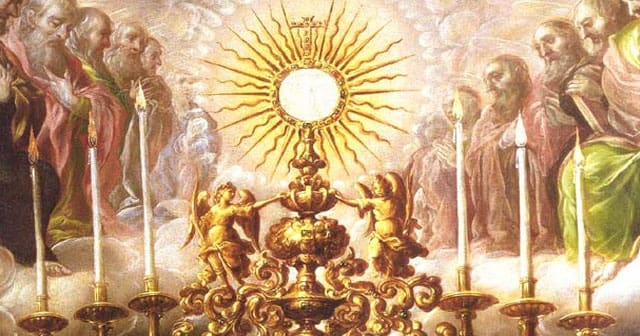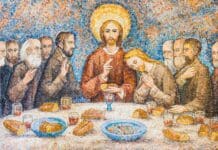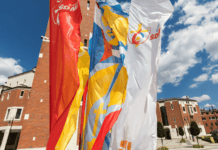The Feast of Corpus Christi, or the Feast of the Body and Blood of Christ (as it is often called today), goes back to the 13th century, but it celebrates something far older: the institution of the Sacrament of Holy Communion at the Last Supper. While Holy Thursday is also a celebration of this mystery, the solemn nature of Holy Week, and the focus on Christ’s Passion on Good Friday, overshadows that aspect of Holy Thursday.
Thus, in 1246, Bishop Robert de Thorete of the Belgina diocese of Liège, at the suggestion of St. Juliana of Mont Cornillon (also in Belgium), convened a synod and instituted the celebration of the feast. From Liège, the celebration began to spread, and, on September 8, 1264, Pope Urban IV issued the papal bull “Transiturus,” which established the Feast of Corpus Christi as a universal feast of the Church, to be celebrated on the Thursday following Trinity Sunday.
At the request of Pope Urban IV, St. Thomas Aquinas composed the office (the official prayers of the Church) for the feast. This office is widely considered one of the most beautiful in the traditional Roman Breviary (the official prayer book of the Divine Office or Liturgy of the Hours), and it is the source of the famous Eucharistic hymns “Pange Lingua Gloriosi” and “Tantum Ergo Sacramentum.”
For centuries after the celebration was extended to the universal Church, the feast was also celebrated with a eucharistic procession, in which the Sacred Host was carried throughout the town, accompanied by hymns and litanies. The faithful would venerate the Body of Christ as the procession passed by. In recent years, this practice has almost disappeared, though some parishes still hold a brief procession around the outside of the parish church.
In countries where it is not a Holy Day of Obligation such as the United States, The Feast of Corpus Christi is celebrated on the Sunday after Holy Trinity.


















I appreciate your contribution!
[…] to ucatholic.com ” Pope Urban IV issued the papal bull “Transiturus,” which established the Feast of […]
I’m so glad celebrating this feast of the most Sacred Heart of Jesus as a bonafied baptized committed Catholic.
And am also proud to be a Catholic.
Sacred Heart of Jesus, have mercy on us.
Thank you uCatholic for all the knowledge we are gaining from your article. They are truly appreciated, we
lpleasePlease remember our son’s Birthday ike to share with our friends and family. Will like to make it public but internet website prevents us from doing so.
PLEASE remember to pray for our son Robert who has passed – Thank you
This is my first year as a Catholic, just received and confirmed this past Easter. It was the presence of the Lord in the Eucharist that drew me to the Church. There is a parish in a neighboring town that has a Corpus Christ procession on Saturday May 28, carrying the Sacrament over a mile right through downtown. I am looking forward to it!
Welcome as a new member of the Body of Christ. May you always know communion in a loving and merciful community of believers.
[…] post The Solemnity of Corpus Christi appeared first on […]
O Jesus, help to understand the love as Your Body and Blood.
[…] uCatholic […]
In many patishes in our area (n e pa) the traditional procession and stational altars are erected & observed, for years even, our bishop would travel to place to place to celebrate the feast, but alas, our previous bishops seemed more interested in other things (like “ladder” climbing).
The Feast of Corpus Christi: O my Jesus, I love, praise and thank so a loving Heart. Give me the strength to make my soul pure.
I read elsewhere that the institution of the Feast of The Corpus Christi resulted from the Eucharistic Miracle in Lanciano in Italy where while a priest who did not believe in the real presence of JESUS in the Most Holy Eucharist, the Eucharistic Host began to bleed during elevation and blood began to pour down his hands.
May I kindly suggest you to verify this?
May GOD Bless You and Keep You and Your ministry in HIS Loving Care and MERCY.